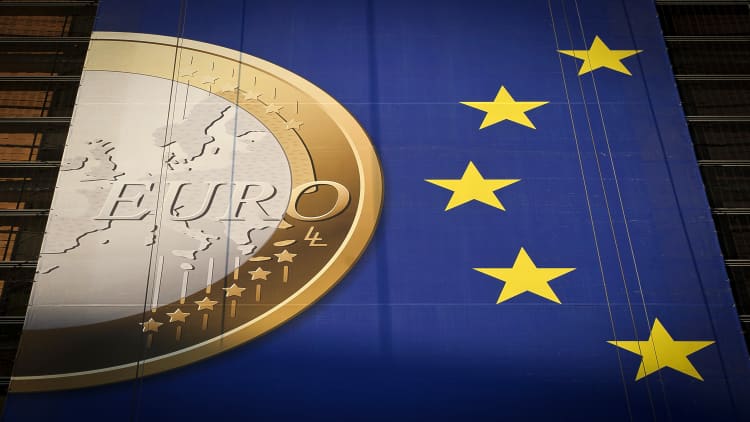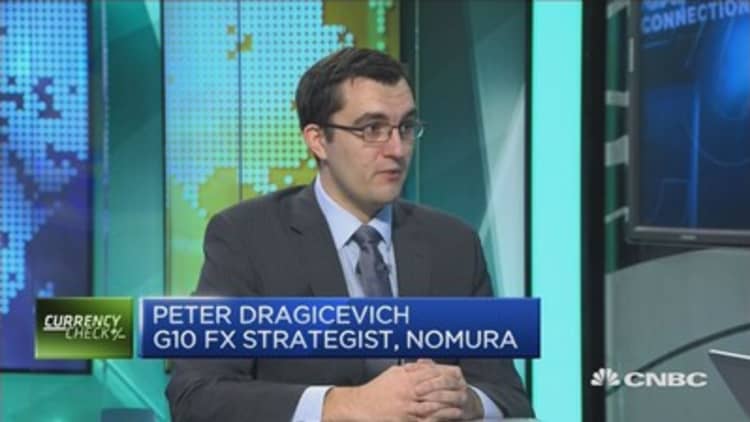
The is feeling the love.
Now that the political risk of the French election is out of the way, and the European economy is improving, the euro has been on a trajectory higher. The gusher of funds into European stocks is also driving buying in the euro, at the same time the dollar is weakening on a recent batch of disappointing U.S. economic data.
Not that long ago, the market was looking for a trade that would take the euro to parity with the U.S. dollar, but kiss that trade goodbye for now. The euro was at 1.10 and rising on Tuesday.
The dollar index, based on a basket of currencies, fell to 98.25, its lowest level since the November election, and much of that move had to do with gains in the euro. The dollar surged after the election of President Donald Trump, whose fiscal and tax policy was seen as a boon for the U.S. economy, but now there is uncertainty around the timing of legislation on those policies.
The dollar's move Tuesday, in fact, was also attributed in part to greater uncertainty created by the uproar around Trump's meeting with Russian officials last week, at which he reportedly revealed classified information.
Strategists say it's not clear whether there will be lingering repercussions for markets, but the market is sensitive to anything viewed as being potentially disruptive to the efforts of the White House and Congress to work on tax reform.
"Today it's the euro," said Jens Nordvig, CEO of Exante Data. "I'm not saying it doesn't matter what goes on in the Trump administration. We do have significant headlines every day.
"It's mostly a euro trend change that's going on. We really broke down in 2014, 2015. It went to 1.40. When the ECB started going to negative rates, we had a move to 1.05 and we've been consolidating around there for two years."
Nordvig said the flows into the euro are significant, and his next target is 1.15 against the dollar.
"We track all central banks in the world. We have models about how they allocate their assets. If you look at who is getting the capital now, versus a few months ago, it's different," said Nordvig.
"If you do the math, it's just much less euro negative than it was two or three months ago.
"You know the Swiss National Bank and Czech National Bank were doing huge interventions. ... They stopped that after the French election." Nordvig said those central banks had been sellers of the euro.
"Momentum can be very powerful," said Thanos Vamvakidis, head of global G-10 foreign-exchange strategy at Bank of America Merrill Lynch.
"Many people were surprised the euro did not appreciate more after the French election," he said. "Last week, we saw the strongest flows into equities ever. ... All the markets were expecting Macron to win. Still, when it happened, it was bullish for markets."
Emmanuel Macron won the French election by a wide margin over Marine Le Pen, a far-right candidate who opposed France's participation in the euro.
Vamvakidis, however, does not see a big move higher for the euro, and his year-end target is 1.08.
Brown Brothers Harriman analysts do see upside for the euro, and analysts also see a next upside target for the euro against the dollar at 1.15.
"It really depends on what happens with the U.S. data and on the fiscal side. Unless something changes, the path of least resistance is higher for the euro," said Win Thin, senior currency strategist at Brown Brothers Harriman.
Vamvakidis said his outlook for the euro is mixed because the U.S. Federal Reserve is expected to raise interest rates, which would drive the dollar higher. But the U.S., along with the U.K., has had the most negative economic surprises of any economy, while Europe has had the most positive economic surprises.
"The European data has been improving for most of this year. This clearly increases the chances the ECB [European Central Bank] will announce tapering QE [quantitative easing] in the next few months, most likely September," he said. That would put the ECB on track to pull back on easing, just as the Fed is expected to hike rates in September.
"We have been saying the euro-dollar outlook is mixed because of what we think about the next few months. It does depend if the Fed hikes rates in June or September or December. When are they going to start unwinding the balance sheet?" said Vamvakidis.
Watch: Euro to test 1.15 at year-end, says strategist



